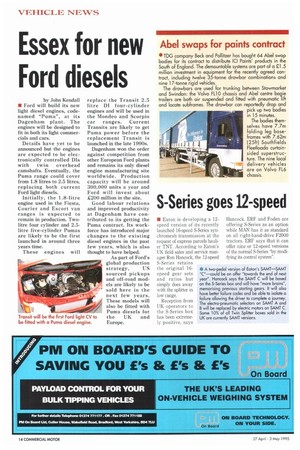Essex for new Ford diesels
Page 16

If you've noticed an error in this article please click here to report it so we can fix it.
by John Kendall • Ford will build its new light diesel engines, codenamed "Puma", at its Dagenham plant. The engines will be designed to fit in both its light commercials and cars.
Details have yet to be announced but the engines are expected to be electronically controlled DIs with twin overhead camshafts. Eventually, the Puma range could cover from 1,8 litres to 2.5 litres, replacing both current Ford light diesels.
Initially, the 1.8-litre engine used in the Fiesta, Courier and Escort van ranges is expected to remain in production. Twolitre four cylinder and 2.5litre five-cylinder Pumas are likely to be the first launched in around three years time.
These engines will replace the Transit 2.5 litre DI four-cylinder engines and will be used in the Mondeo and Scorpio car ranges. Current Transits are likely to get Puma power before the replacement Transit is launched in the late 1990s.
Dagenham won the order against competition from other European Ford plants and remains its only diesel engine manufacturing site worldwide. Production capacity will be around 300,000 units a year and Ford will invest about £200 million in the site.
Good labour relations and improved productivity at Dagenham have contributed to its getting the Puma contract. Its workforce has introduced major changes to the existing diesel engines in the past few years, which is also thought to have helped.
As part of Ford's global production strategy, US sourced pickups and off-road models are likely to be ' sold here in the next few years. These models will also be fitted with Puma diesels for the UK and Europe.




























































































































